
The last National Social Dimension Initiative (SDI) Conference “Leaving No One Behind in the Process of EU Integration” was held on September 17th in Belgrade.
The event was organized by Arbeiter Samariter Bund SEE in cooperation with the local partner Initiative for Development and Cooperation (IDC) Serbia, and together with The Ministry of Labour, Employment, Veteran and Social Affairs of the Republic of Serbia.
The Conference is organized within Social Dimension Initiative (SDI), launched in 2018 as joint endeavor of the ASB and local civil society organisations from the Western Balkans, and supported by a group of distinguished members of the European Parliament, to enhance dialogue between the civil sector, citizens and political elites both in European Union (EU) and Western Balkans (WB) on the necessity for stronger social dimension of the EU integration for WB countries.
Event was attended by more than 100 participants, including representatives of the EU Delegation, German embassy in Serbia, representatives of the Ministry of Labour, Employment, Veteran and Social Affairs, Ministry of European Integration, representatives of national and regional media, regional and local civil society organisations (CSO), representatives of the municipalities that participate in SDI, as well as members of the IRIS network.
The Conference was opened by Mr. Zoran Đorđević, Minister of Labour, Employment, Veteran and Social Affairs of Serbia who presented socio-economic situation in Serbia and how this Initiative contributes to solving of identified problems: “During this process, we found various problems in local municipalities’ strategies, social services providers, social entrepreneurship, so the Ministry will continue to work on improving social protection and to support and develop this Initiative“. He presented the situation in social policy and employment as well as reforms within these systems in the last years. Issues of the impact SDI might have in this respect and on cooperation between public and civil sector were also discussed.
Mr. Đorđević stated that 65 less-developed municipalities from the region and 15 from Serbia are participating in the project launched by ASB in order to strengthen the dialogue between the civil sector, the citizens and political elites and strengthen the social dimension of EU integration. As he has explained, each municipality has prepared three projects worth EUR 50,000 in total.


Social Dimension Initiative is implemented by Arbeiter Samariter Bund South East Europe, together with national partners in 6WB countries: IDC Serbia, ARSIS Albania, SOS Podgorica from Montenegro, La Strada form North Macedonia and LIR CD from Bosnia and Herzegovina, and it is fully financed by Arbeiter Samariter Bund Deutschland.
On this occasion, Mr. Knut Fleckenstein, Federal Board Chairperson ASB e.V. Deutschland addressed the participants on the Conference, emphasizing that this Initiative has main goal to make impact on the people and it should be on the top of all social policy agendas: “Today, this is about the people and this Initiative illustrates how human and how effective our policies are. Today we will present to you 45 projects from 15 least developed municipalities in Serbia. The process of their development revealed great need for these interventions but also great need for support, for mentoring, for assisting local actors in formulating and implementing concrete projects”.
He also recalled that, last year, all ministers in charge of social policy from the Western Balkans countries have signed a Declaration by which they pledged to focus more on the social aspect of European integration, and not only on the technical aspect of the opening of chapters.
He further emphasized that ASB wishes to support the municipalities in the Western Balkan region, as well as non-governmental organisations, to work together in order to achieve better social inclusion.
“The EU integration will mean nothing if citizens do not feel the progress. These issues should not be left to politicians only, since we must all work together if we are to succeed,” Mr. Fleckenstein has said.


Investing in social sector is one of the top priorities for EU accession countries. The investment from IPA funds currently available to us as a candidate country, multiplies when we become an EU member.
“In the previous IPA period from 2014, out of total EU support to Serbia (1.5 billion),125 million EUR was allocated for social projects” said Mrs. Jadranka Joksimovic, Minister of European Integration at SDI Conference in Belgrade adding that the Social Dimension of European Integrations is not enough on the agenda, especially since opening chapters 2 and 19 is very significant question, and leaving no one behind is key matter.
She stated that Serbia has been using IPA pre-accession funds for a long time, and that it has around EUR 200 million available at the annual level.
“We have done a good job, not only because of the quality of projects in various fields, from infrastructure and public administration reform to social policy, but because we have shown seriousness, and we are preparing at this stage for what will come after the accession to the EU, and that is the availability of EU structural funds,” Joksimović has said, adding that Serbia will become an active part of the EU cohesion policy once it becomes a Member State.
“The projection is that, with our GDP at the moment of accession, we would have around EUR 1 billion annually for various economic and social development projects,” Joksimović has stressed.
According to her, in the period from 2014 to 2020, Serbia has had EUR 1.5 billion available through IPA funds, of which EUR 125 million have been allocated for social protection programmes.
She added that various projects have been funded with these funds, ranging from retraining, lifelong learning to various programmes for strengthening social protection mechanisms.
“I believe that a significant component will again be allocated for the European social policy, after the forming of the new European Commission and when IPA 3 funds for the period 2021–2027 start to be negotiated,” Ms. Joksimović has said.
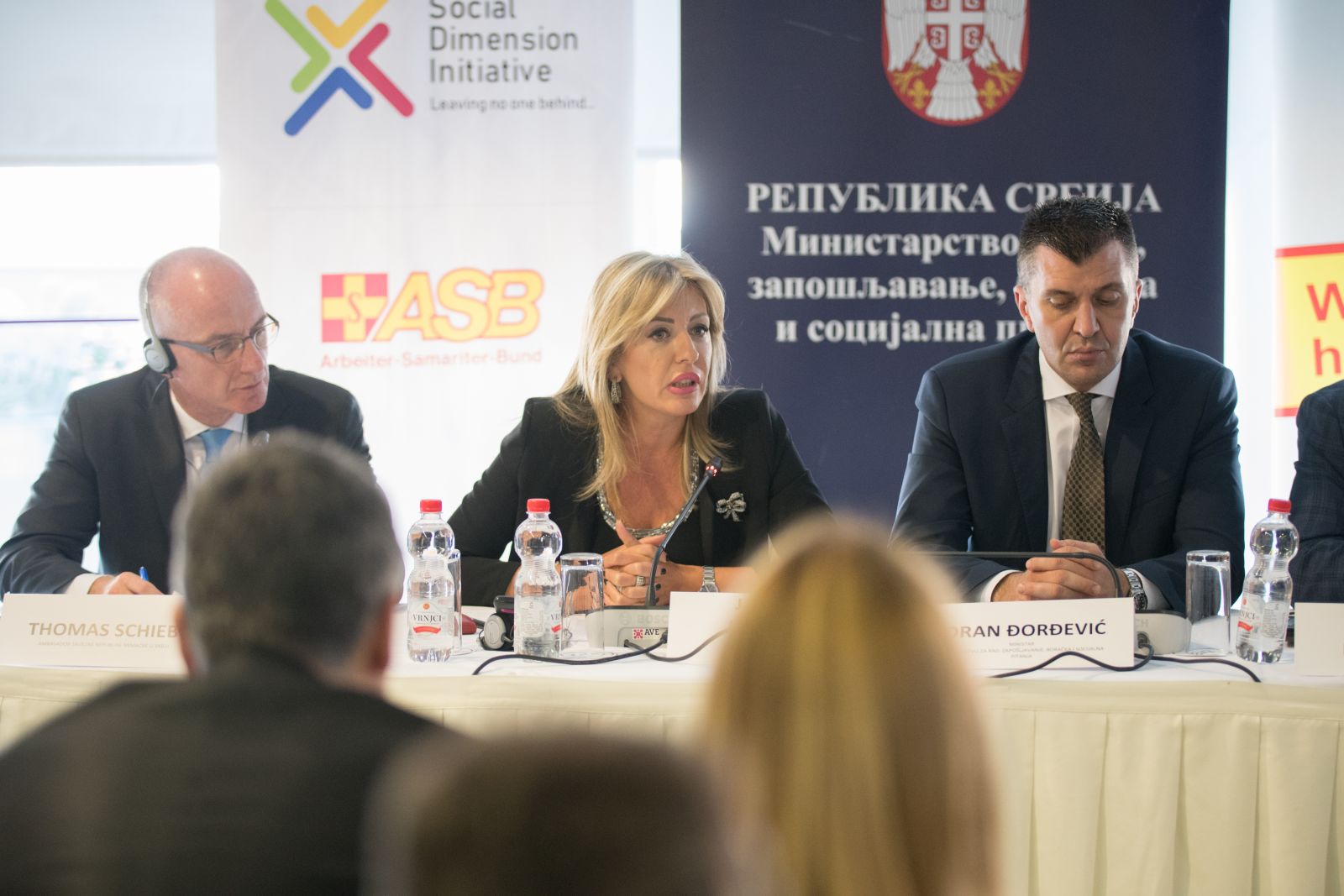
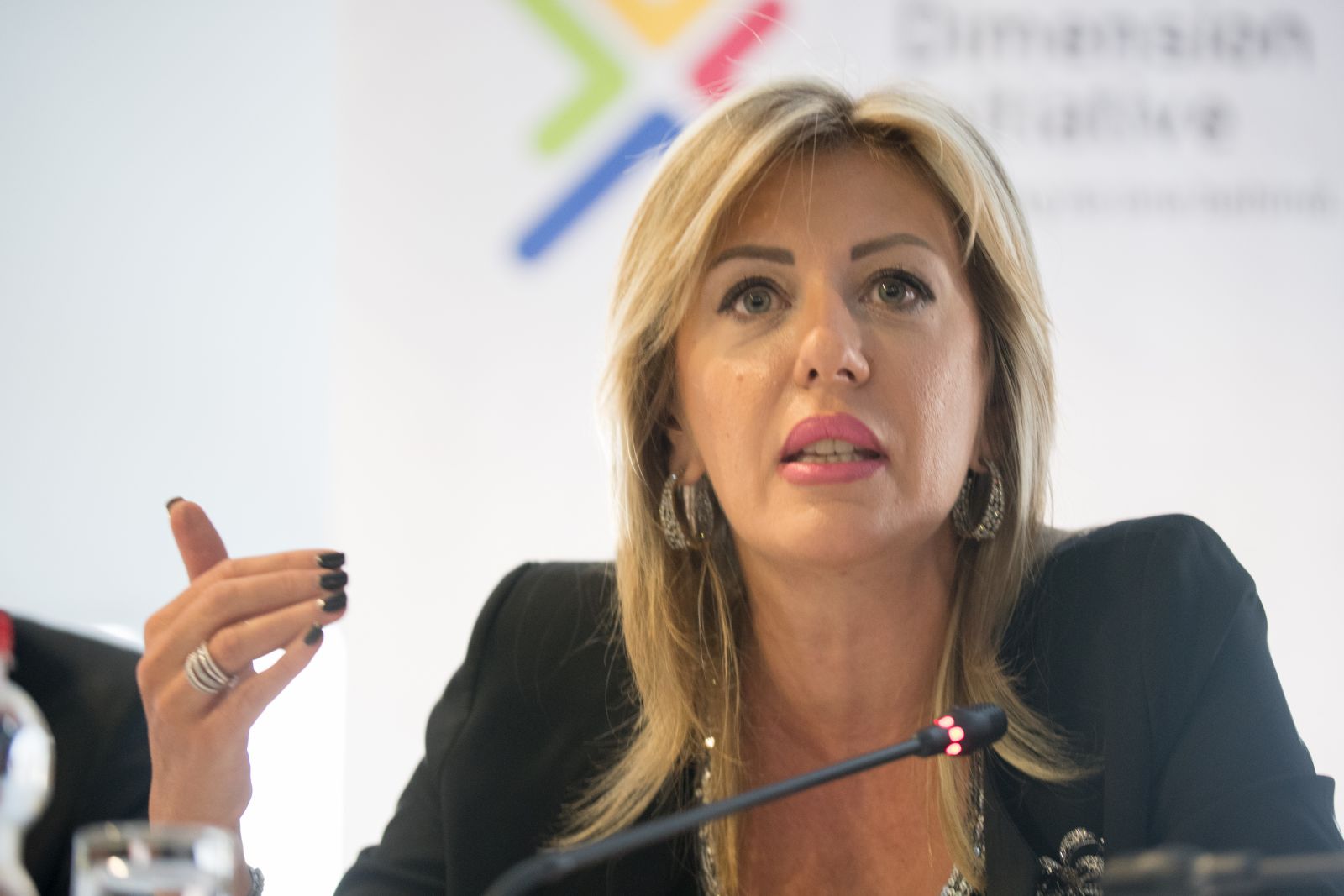
“Also, cooperation between public and civil sector and regional approach is very important for sustainability” said Minister Joksimovic, and in this context, she stressed the importance of participation of citizens’ initiatives in social policy, primarily, the civil sector and non-governmental organisations, assessing that, in this way, the authenticity and irrevocability of the European integration process is affirmed.
“The ideal of Europe, since its creation, has been a truly united, socially-oriented and solidary European community. For it to be such, it must also include the countries that are not currently its members, i.e. the candidate countries and potential candidates for EU membership,” Jadranka Joksimović said.
She recalled that the social dimension, i.e. social cohesion has been particularly stressed in the Western Balkans Enlargement Strategy 2018, along with the objectives of sustainable development and environmental protection.
“These are precisely the topics that the citizens of the EU have unambiguously supported at the last elections for European institutions,” Joksimović has noted.
ASB and IDC cooperate for years now on a number of projects in Serbia that are directly supported by the EU and German government. Therefore, we have welcomed at the Conference special guests, distinguished representatives of the EU, H.E. Mr. Sem Fabrizi, Head of the Delegation of the European Union in the Republic of Serbia and H.E. Mr. Thomas Schieb, Ambassador of the Federal Republic of Germany in Serbia.
“ EU supports social inclusion through achieving tangible results. We promote equality, solidarity, tolerance and fundamental socio economic human rights, the right to decent living and work conditions, the right to adequate social protection and proper education and the right to live in a healthy and safe environment” , emphasized Mr. Fabrizi adding that the EU is the largest and most important donor in this sector in Serbia, with total investment of 115 million EUR only in the last five years. During this period many projects have been successfully implemented by municipalities, centers for social work and NGOs in more than 90 towns and municipalities, bringing direct benefits to people across the country.
“Let me conclude by looking at the wider picture. What we are talking about today is a demonstration of the EU’s commitment to protect fundamental rights; we will never stop fighting for human rights and social inclusion of every citizen of Europe, whoever they are. I believe that joint effort and cooperation between civil sector organizations and national and local stakeholders are the key to make a difference for those in needs” pointed Mr. Fabrizi . He also remarked that the Government of Serbia is the bearer of social inclusion in Serbia; nonetheless there is an important role for municipalities, civil society organizations and citizens at the local level.
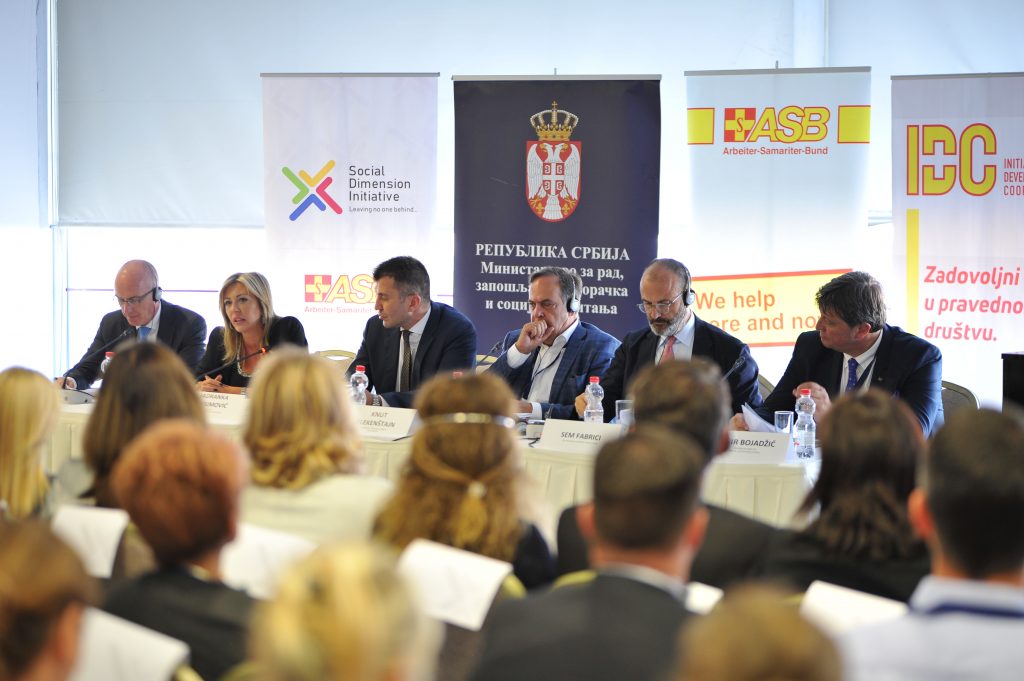
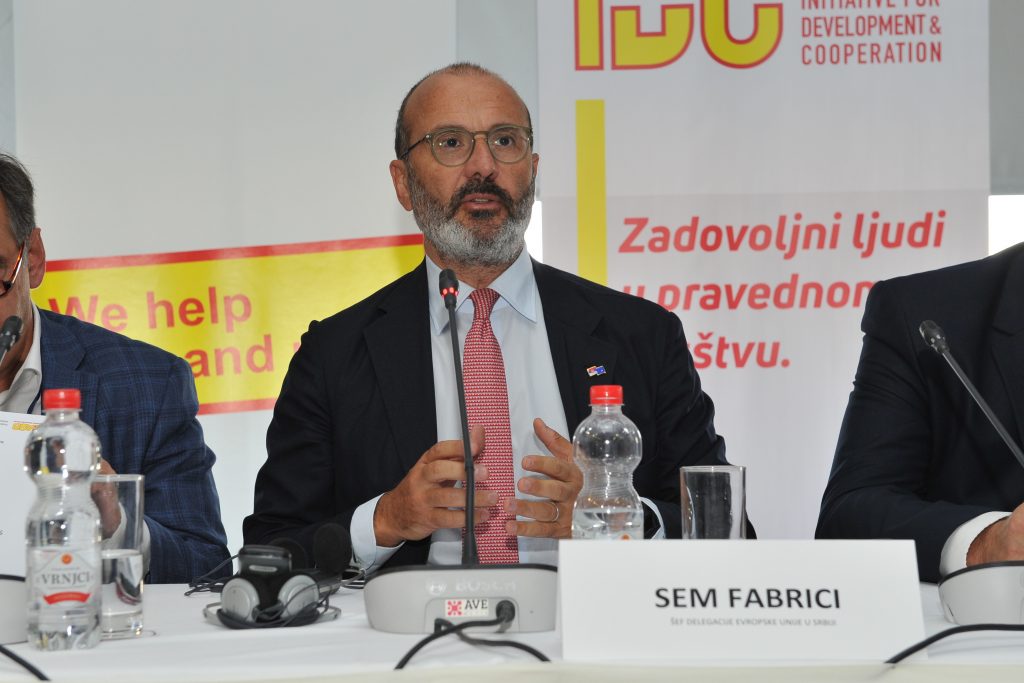
The German Ambassador to Serbia, Mr. Thomas Schieb, has stressed that Germany supports Serbia in the EU accession process, and that this process does not deal only with the political and economic reforms, but also with social issues.
“That is why we support ASB and all their projects that are being implemented in Serbia, as well as GIZ projects. We want all citizens to feel the benefit of European integration, especially the vulnerable groups at the local level,” Mr. Schieb has said adding that social justice is one of the top concerns for German citizens, just after environment.


The SDI has main goal to ensure support of institutions, donors, stakeholders for improvement of social sector in region, through strengthening of the regional cooperation and joint efforts of public and civil sector.
“We wish to do something for real; we have 195 ready-to-be-funded projects which will be put in regional portfolio and presented on Closing Regional Conference in Sarajevo in the next period”, said Mr. Elmir Bojadzic, Regional Director for ASB South East Europe.
He stressed that ordinary citizens, especially in smaller communities, often do not feel the actual benefits of the European integration process, and that the goal of this project is to change that.
“We also want to include politicians, diplomats, to join forces and work together towards improving the lives of those who are on the margins of society and who have not yet felt the benefits of activities that have been conducted at the political level for years,” pointed out Bojadzic.
“I use this opportunity to invite you to join efforts with us to continue this process to make this happen and to finance those projects. I am sure that today we are sending strong signal and clear message that WE CARE AND WE LEAVE NO ONE BEHIND” concluded Mr. Bojadzic.


The best example of the successful cooperation of the ASB and the local partners is the mentoring program for 65 least developed municipalities in the WB, conducted within SDI. The program provided assistance in developing project ideas for the joint Regional Portfolio. Almost 200 projects proposals are developed, ready for financing and implementation.
Mr. Igor Kojcic, Project Manager in IDC Serbia, presented Serbian municipalities’ project ideas and the participants had an opportunity to learn more about the mentoring program conducted by ASB and IDC in Serbia.
“Problems in local municipalities are complex and specific and it is impossible to solve them without support of local government. It is important to work on strengthening local social service providers and on finding new solutions such as social entrepreneurship” – said Mr. Kojčić.


As the SDI is product of regional cooperation, proves that leading NGOs under the SDI from 6WB countries are part of the biggest regional network that implements social projects through years – Iris Network.
Ms. Jelena Andjelic, Project Manager in IDC Serbia, presented the network on the Conference, emphasizing that
IRIS gathers currently around 200 member organizations that provide different types of social services to different vulnerable groups: people with disability, children and youth at risk, women victims of family violence, refugees, asylum seekers etc.
“It is very important to have in mind the context of each and every of this municipalities under the SDI, so we could find the best way to help them to improve they society through this projects” said Mrs. Andjelic when it comes to SDI mentoring program in Serbia conducted by ASB and IDC, Iris Network members.


Last panel on SDI National Conference was dedicated to investments in social cohesion where main speakers looked back on donations in social sector and talked about future investments.
Ms. Dragana Miloševic, Project Manager from UNOPS RSOC pointed out lessons that have been learned through implementing different social projects in Serbia and expressed desire for creating partnerships with local municipalities in the future programs.


Mr. Robert Bu, Project Manager, Inclusion of Roma and other marginalized groups in Serbia from GIZ, presented project “Inclusion of Roma and other marginal groups in Serbia”.
Ms. Mirjana Maksimović, Programme Manager for EU Policies – Human Resources’ Development, Social Inclusion and Minorities – Operations I, Delegation of the EU in the Republic of Serbia said that EU needs good ideas when it comes to project financing: “Employment and social service sector is one of those that will get more finances for projects implementation”.
Last panelist, Ms. Natalija Matunović – Milošević, Head of Department for Social Inclusion Programme Manager, Programme: EU Support to Roma Inclusion- Strengthening Local Communities in SCTM said that this projects are specific because they have people centered: “Cooperation of different actors and participation of beneficiaries and local communities are the key for successful implementation of social projects”.


Gordan Velev, Director of ASB South East Europe Office in Serbia and SDI Regional Coordinator, closed the SDI conference in Belgrade, reminding that under the SDI, 200 projects proposals ready for financing and implementation is developed from 6 WB countries and will be presented very soon at the Closing Regional Conference in Sarajevo.

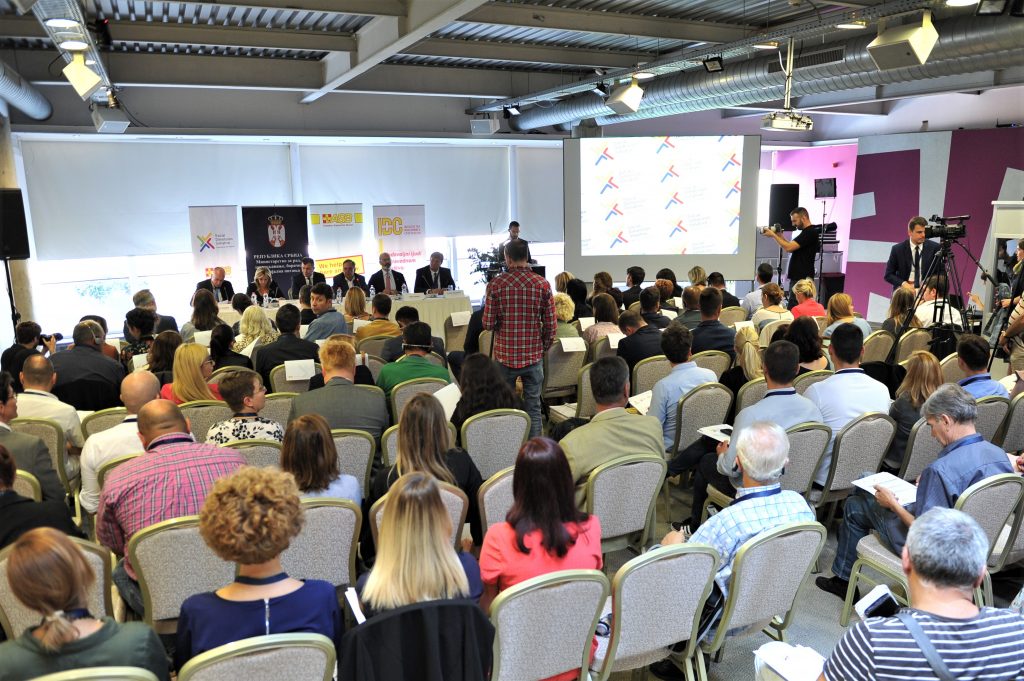
Under the SDI, 6 national conferences were held in 2019 in Tirana, Prizren, Podgorica, Sarajevo, Skopje and Belgrade.
Namely, at the Opening Regional Conferencethat was held in November 2018 in Belgrade, the SDI gathered Ministers in charge of the social policy from the Western Balkans, regional civil society and media as well as representatives of the EU institutions and other international partners have expressed their firm commitment to support the Initiative. On this occasion, the Declaration on Improving Social Policy in the Western Balkans was signed by all WB social Ministers and constructive dialogue initiated furthering improvement of social and employment policies and measures.
See you soon in Sarajevo.

ASB is a German aid and welfare organisation, engaged in areas such as civil protection, rescue services and social welfare services. As a non-political organisation, ASB has, since its foundation in 1888, provided rapid and direct help to all those in need of our support.
Address:
ASB SEE Main Office Sarajevo, Aleja Bosne Srebrene 4, 71 000 Sarajevo, Bosnia and Herzegovina
Tel:
+387 (0)33 468 366
E-mail: